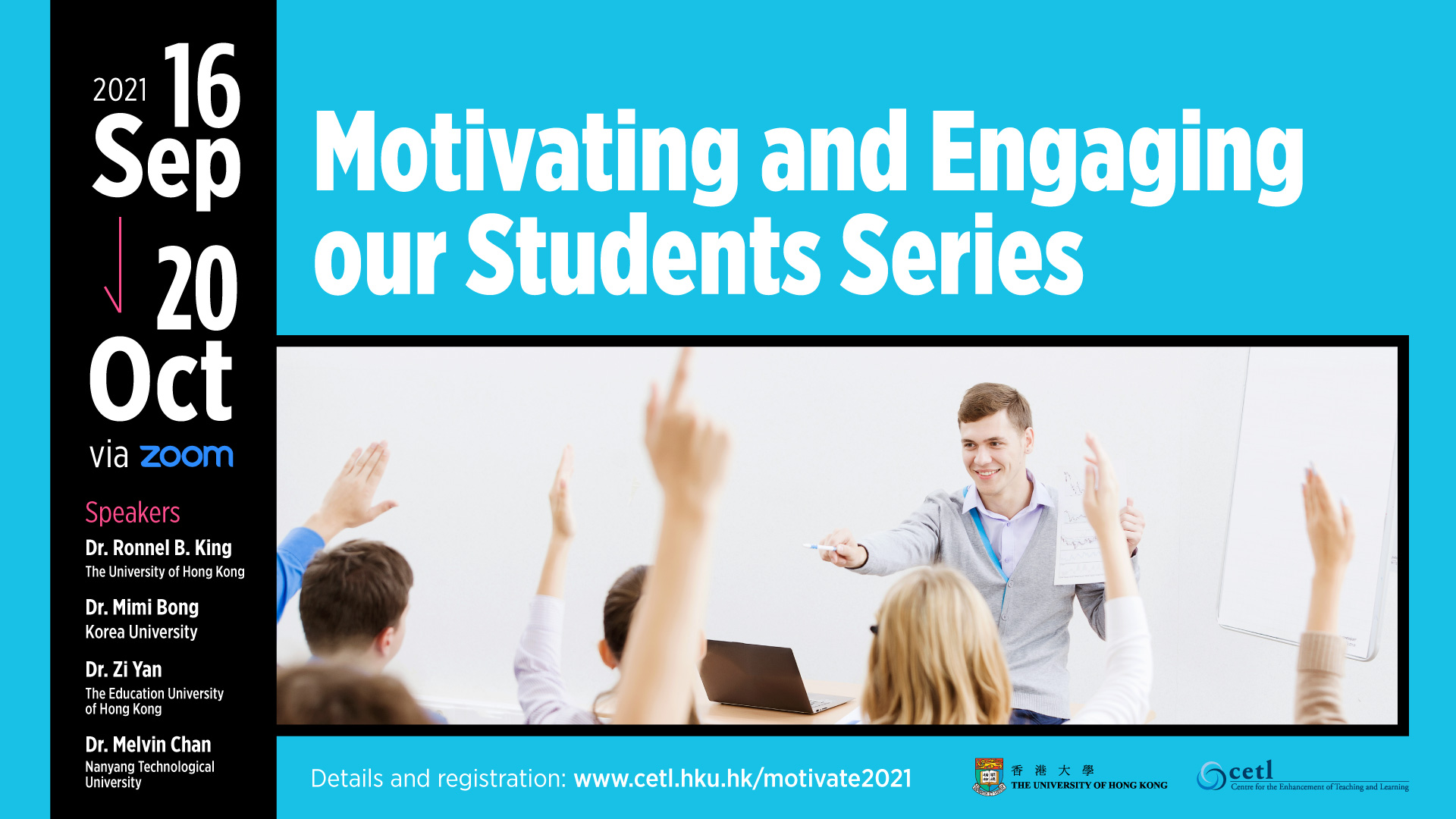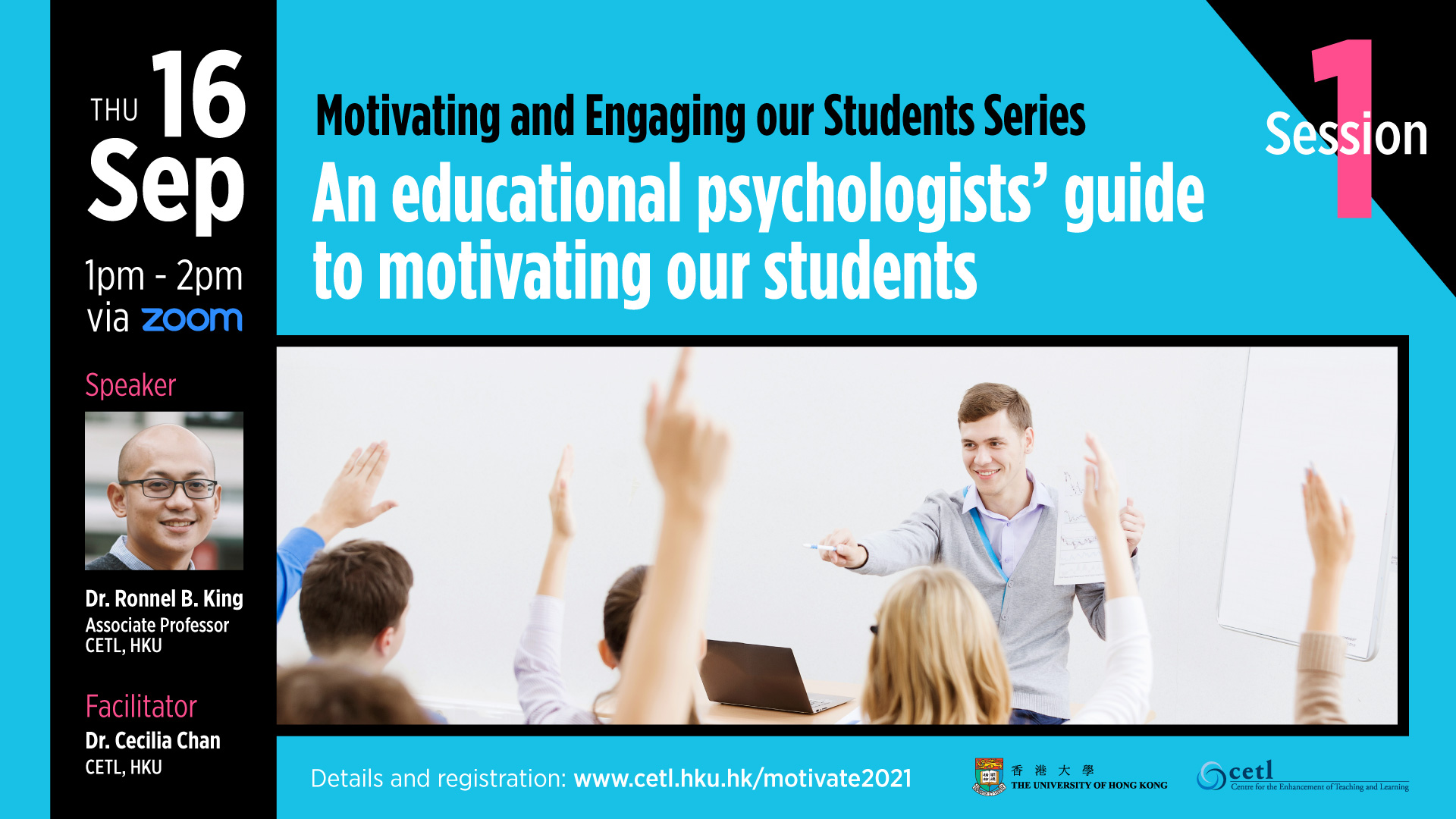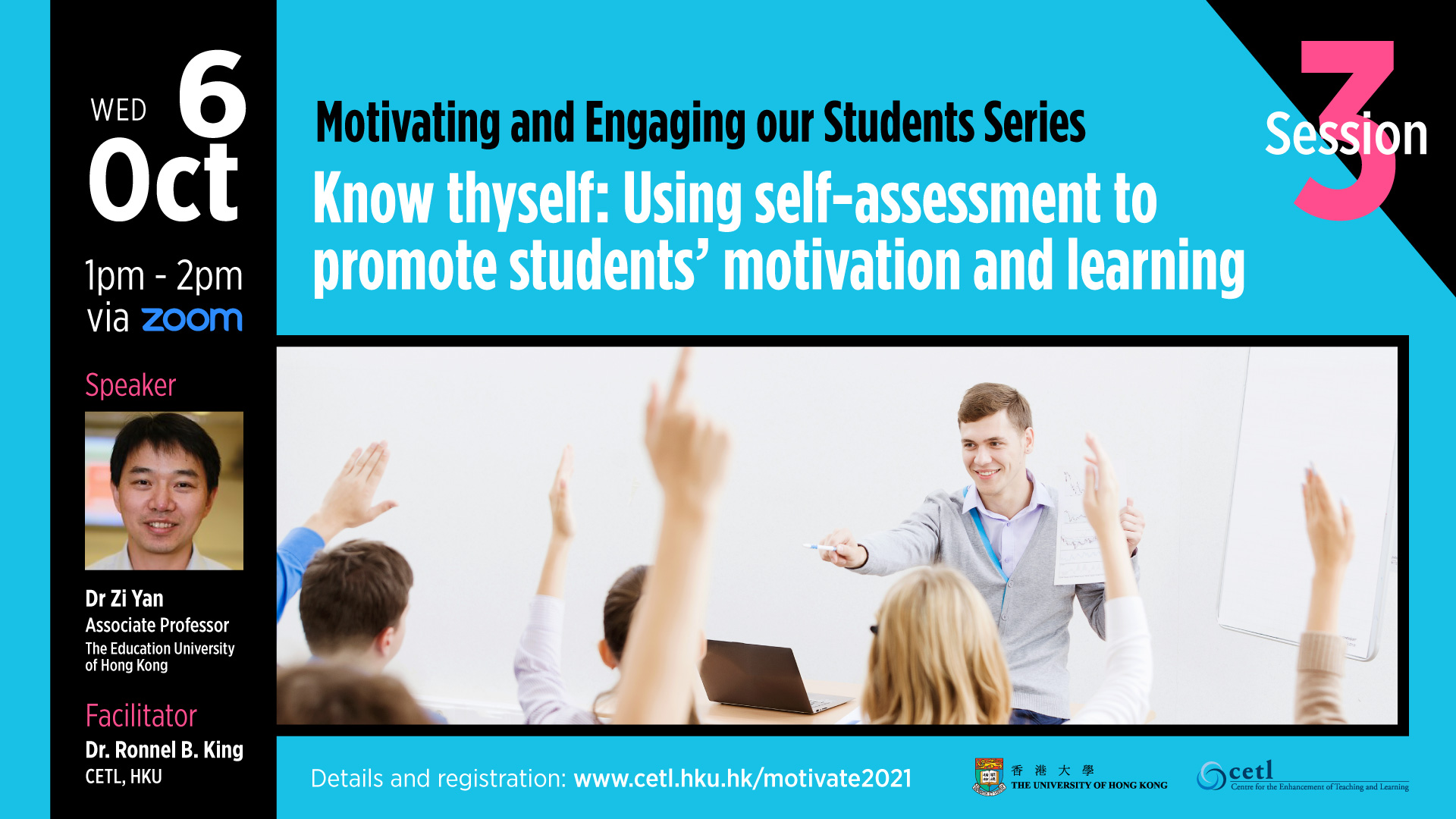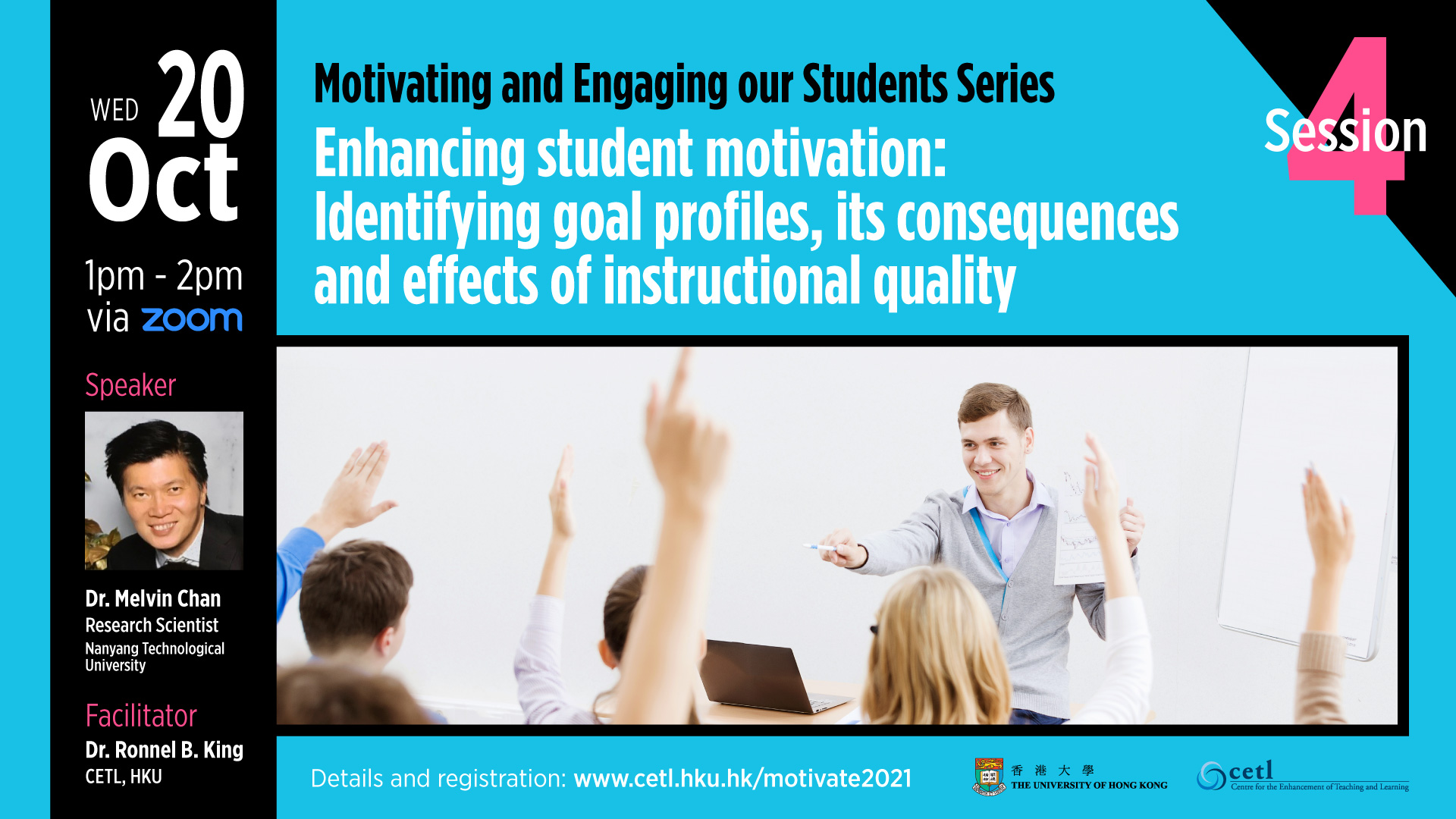
Organised by Centre for the Enhancement of Teaching and Learning (CETL)
How can we better motivate and engage our students? This is a question that many of us might be asking ourselves as we welcome our students back to campus after a long hiatus due to the pandemic.
This series, organized by the Centre for the Enhancement of Teaching and Learning (CETL), aims to offer evidence-based principles and strategies to use in motivating students to learn. During this series, we will have the chance to listen to educational experts on motivation and engagement as they share with us their research and what implications these might have for teaching and learning in higher education. We have speakers from Hong Kong, Singapore, and Korea to share with us their work and how this might be relevant for teachers at HKU.
This series consists of four sessions. All sessions will involve an expert presentation and will also give participants the space for creative thinking, expert feedback, and collective discussions. We shall adopt the following format.
- The first part of the session – expert’s presentation
- The second part of the session – QA/group discussions
We are excited to have you join us in this series! Together, let’s create a more motivating learning environment for our students!
-CETL, HKU

Date : 16 September 2021 (Thursday)
Time : 1:00pm - 2:00pm
Venue : Zoom
Speaker : Dr. Ronnel B. King, CETL, HKU
Session Facilitator : Dr. Cecilia Chan, CETL, HKU
Abstract
As we start the new semester, teachers might be asking themselves the question: How can we create a better learning environment that motivates our students? In this talk, I will draw on the educational psychology literature to illustrate how key facets of the teaching and learning environment can facilitate or inhibit students’ motivation and engagement. Particular attention will be paid to the role of instructional strategies, feedback, assessment practices, and interpersonal style and how teachers can leverage these to optimize students’ motivation. I will draw on different theoretical perspectives and also my own research to present evidence-based insights which might be useful for teachers as they start the new semester.
About the Speaker
Dr. Ronnel King is an Associate Professor at the Centre for the Enhancement of Teaching and Learning, Faculty of Education, The University of Hong Kong. He also holds honorary appointments at The University of Macau and The Education University of Hong Kong. He is recognized as among the top 2% of the most highly-cited education scholars in the world. His research focuses on understanding the factors that underpin student motivation and well-being and designing positive psychology & education interventions to promote these optimal states. He is currently guest editing special issues on teaching and learning during the COVID-19 pandemic in Educational Psychology and Educational and Developmental Psychologist.

Date : 28 September 2021 (Tuesday)
Time : 1:00pm - 2:00pm
Venue : Zoom
Speakers : Dr. Mimi Bong, Korea University
Session Facilitator : Dr. Ronnel B. King, CETL, HKU
Abstract
There exists a host of constructs that represent some aspects of student motivation. In this talk, I will focus on three constructs that deserve particular attention from instructors at all levels of schooling – self-efficacy, achievement goals, and task value. Self-efficacy refers to individuals’ subjective convictions that they can successfully carry out a course of actions required to attain the desired outcome. Achievement goals refer to the reasons and purposes underlying achievement-related behaviors. Task value refers to the importance, usefulness, and interest that individuals perceive in the given task. Students learn and perform best when they feel highly self-efficacious toward the academic tasks at hand, pursue the tasks primarily to learn new skills and improve their competence (as opposed to outperform others or demonstrate their ability), and believe the task is important, useful, and interesting. Empirical evidence from my research will be presented along with implications for motivating teaching.
About the Speaker
Dr. Mimi Bong is a Professor of Educational Psychology and the Director of bMRI. She received her Ph.D. in Educational Psychology and Technology from the University of Southern California and was an Associate Professor of Educational Psychology, Research, and Technology at the University of South Carolina. Her research focuses on student motivation and self-regulated learning with particular emphasis on self-efficacy beliefs and achievement goals. She was recognized as the 8th most productive educational psychologist for the period of 1997-2001 and received the ‘Richard E. Snow Award for Early Contributions in Educational Psychology’ from the American Psychological Association/Division 15. She has served or currently serves on the editorial boards of AERA Open, American Educational Research Journal, Child Development, Contemporary Educational Psychology, Educational Psychologist, Educational Psychology Review, Educational Researcher, Journal of Educational Psychology, Journal of Experimental Education, Learning and Individual Differences, and Theory Into Practice. She has also served as Associate Editor of the American Educational Research Journal’s section on Teaching, Learning, and Human Development and Editor for the Korean Journal of Educational Psychology, a flagship journal of the Korean Educational Psychology Association.

Date : 6 October 2021 (Wednesday)
Time : 1:00pm - 2:00pm
Venue : Zoom
Speaker : Dr. Zi Yan, Department of Curriculum and Instruction, The Education University of Hong Kong
Session Facilitator : Dr. Ronnel B. King, CETL, HKU
Abstract
Student self-assessment, which pertains to a set of practices that allows students to evaluate their own learning progress and outcomes, is a crucial lever that could promote motivation, self-regulation, and lifelong learning. This seminar aims to report research on student self-assessment and how this can be leveraged to promote students’ motivation and learning. I will share my empirical work which has focused on the whole “chain” of student self-assessment from what factors enables self-assessment, to key self-assessment practices, all the way to how self-assessment can promote motivation and learning. I will also share potential interventions that teachers can use to promote students’ self-assessment.
About the Speaker
Dr. Zi Yan is an Associate Professor in the Department of Curriculum and Instruction at The Education University of Hong Kong. His research interests focus on two related areas, i.e., educational assessment in the school and higher education contexts with an emphasis on student self-assessment; and Rasch measurement, in particular its application in educational and psychological research. He is the Chief Investigator of several competitive external grants including four General Research Fund projects supported by the University Grants Committee (Hong Kong). A recent book co-edited with Lan Yang is entitled, Assessment as learning: Maximising opportunities for student learning and achievement.

Date : 20 October 2021 (Wednesday)
Time : 1:00pm - 2:00pm
Venue : Zoom
Speaker : Dr. Melvin Chan, National Institute of Education, Nanyang Technological University
Session Facilitator : Dr. Ronnel B. King, CETL, HKU
Abstract
Education scholars have long considered motivation an important construct that explains why students do well and succeed in school, while others struggle to keep up their learning. Among the most active research in educational psychology is the study of achievement motivation that contrasted two types of learning orientations: mastery and performance. The mastery-performance dichotomy has since been expanded to account for variations across different levels of motivational valences: those motivated to achieve competence and those striving to avoid the appearance of incompetence.
In this talk, I will share key insights on the types of goal profiles that have been identified, how these profiles are linked to various student outcomes and how they may be promoted (or inhibited) by different types of instructional practices. Drawing on relevant theory and research, we will examine possible explanations for these relationships. Together, we will explore some examples of motivational challenges faced by teachers, what this means for classroom practice and consider some strategies that can help to sustain student motivation in learning.
About the Speaker
Dr. Melvin Chan is a Research Scientist at the National Institute of Education, Singapore, and is affiliated with the Centre of Research in Pedagogy and Practice. He also serves as Assistant Dean at the Office of Education Research, overseeing matters related to research data management. He was previously managing editor of the Asia Pacific Journal of Education. His research in the last decade has focused on examining factors and effects of teaching and learning on student outcomes, including how individual and institutional contexts affect educational opportunity and advancement. His current research focuses on examining students’ post-secondary transitions and pathways.
For information, please contact:
Ms. Lavina Luk, CETL
Phone: 3917 5272; Email: ytluk89@hku.hk













